The LDA Podcast: An Exploration of Evidence-Informed Approaches to Learning and Development
Originally spearheaded by noted learning scientists and consultants, Will Thalheimer and Matt Richter, and originally called Truth In Learning, the updated, upgraded, and rebooted LDA Podcast explores all aspects of the Learning and Development field- validated tools and resources for better training, debunked learning models, controversies in the industry, and so much more. Now hosted by Matt and Clark Quinn (another noted scientist and consultant, the podcast will dive deeply into what makes learning and development more effective and beneficial for its end-users, stakeholders, and practitioners. Along with our monthly and general episodes, we will also offer a monthly series on AI, hosted by AI expert, Markus Bernhardt. Over the upcoming season, The LDA Podcast will: -- Keep you current with L&D research and innovations -- Unpack complex ideas and concepts -- Sharpen your critical thinking skills -- Stimulate your L&D grey cells (although this objective may not be evidence-based) N...
Episodes
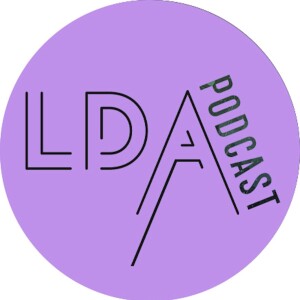
Tuesday Jul 16, 2024
Tuesday Jul 16, 2024
We are delighted to have the great Koreen Pagano join the podcast for the furthering conversation on skills. We get Koreen’s perspective and definition of skills.
Matt alludes to the earlier LDA Podcast, The “What the Skills” Episode with Paul Kirschner, as well as the research work he did with John Sweller and Richard Clark published in their article:
Kirschner, P.A., Sweller, J., & Clark, R.E. (2006). Why minimal guidance during instruction does not work: An analysis of the failure of constructivist discovery, problem-based, experiential, and inquiry-based teaching. Educational Psychologist. 41(2), 75-86.
In the episode, we dig into whether one can teach, and how one can teach, conflict resolution, critical thinking, and even tease the subject of teaching leadership.
The debate really gets playfully heated when they talk about critical thinking. Clark uses the famous phrase, “yes… and…” Matt references the great improv in business practitioner, Kat Koppett. Her first book, Training to Imagine is a great source to go into yes, anding… in more depth.
Matt references evolutionary skills and brings up the references from Sweller:
Sweller, J. (2016). Cognitive Load Theory: What We Learn and How We Learn. In M. Spector, B. Lockee, & M. Childress (Eds.), Learning, design, and technology (pp. 1–28). Springer. https://doi.org/10.1007/978-3-319-17727-4_50-1
And Geary
Geary, D. C. (2008). An evolutionarily informed education science. Educational Psychologist, 43(4), 179–195. https://doi.org/10.1080/00461520802392133
We discuss what it means to master skills, and develop automation. We also explore how to assess whether a person has a skill or the potential to develop a skill.
We debate transferability and whether skills— especially complex skills need be taught within a contextual domain. Matt argues yes. Koreen argues no. Clark argues “It depends.” They also debate whether, and how much, talent plays into skill development. Heck… is talent even a thing? The big argument centers around Carnegie Hall and playing golf! And of course, Anders Ericsson is a part of the conversation.
Ericsson, K. A., & Charness, N. (1994). Expert performance: Its structure and acquisition. American Psychologist, 49: 725–747.
Matt referenced the Human Development expert, Richard Lerner.
Koreen references the hostage negotiator, Chris Voss and his book, Never Split the Difference.
And we even debate how transferrable the skill of game design is!
And we talked about so much more!!!
Of course, we run out of time because we had so much fun chatting with Koreen… that we didn’t get to Best and Worst! Next time… and Koreen will be back!
More about Koreen:
Koreen Pagano, Chief Product Officer at Thrive Learning and founder of Isanno, is a globally recognized product executive with deep expertise in learning technologies, skills strategy, AI, analytics, and immersive technologies. Koreen has held product leadership roles at companies including Lynda.com, LinkedIn, D2L, Degreed, and Wiley. Koreen previously founded Tandem Learning in 2008, where she pioneered immersive learning through virtual worlds, games, and simulations. She has taught graduate courses at Harrisburg University and provided advisory and consulting services to a range of tech companies in the corporate learning, VR, and K12 education markets. Koreen is a seasoned international speaker, author of the book Immersive Learning and an upcoming book on organizational skills transformation due out in 2025.
You can find Koreen here:
https://isanno.com
https://www.linkedin.com/in/koreenpagano/

Monday Jul 08, 2024
Monday Jul 08, 2024
Join Markus Bernhardt and Bjorn Billhardt as they explore how AI is reshaping leadership development. In this episode, discover the role of AI-driven simulations in creating dynamic learning experiences and why social interaction remains crucial. Explore the innovative 12-week MBA program designed for today’s leaders and learn how AI can elevate L&D from a support function to a strategic powerhouse. Don’t miss this engaging discussion on blending technology with human connection to transform professional growth.
Shownotes:
Bjorn Billhardt on Linkedin: https://www.linkedin.com/in/bjornbillhardt/
The link to Abilitie, a Top 20 Leadership Development Company: http://www.abilitie.com
Link to the 12-Week MBA, a part-time, virtual MBA certificate course: http://www.12weekmba.com
The Voice AI demo Bjorn referenced: https://fastvoiceagent.cerebrium.ai/
How Bjorn keeps up to date:
Ethan Mollick’s - One Useful Thing - https://www.oneusefulthing.org/
Wes Kao’s Newsletter - https://newsletter.weskao.com/
Matt Tower’s weekly roundup of happenings in the EdTech community: https://www.etch.club/p/etch-weekend-reading-52724
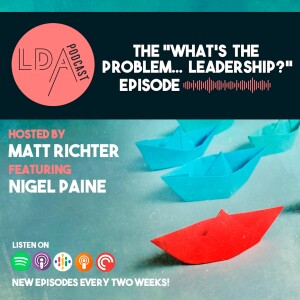
Friday Jun 14, 2024
Friday Jun 14, 2024
We have the wonderful Nigel Paine back in the house for an exciting and banter-filled episode about leadership. It's a continuation of the previous Nigel show, The "Follow the Leader" Episode.
Nigel and Matt continue the conversation about the nuance of leadership-- what the heck is it practically as organizations struggle to get their arms around it.
A bulk of the discussion centers on the work of the wonderful historian and leadership expert, Keith Grint from the Säid Business School of the University of Oxford and also the University of Warwick, both in the UK. You can learn more about Keith here: https://www.sbs.ox.ac.uk/about-us/people/keith-grint
And a wonderful primer on Keith's work is his short book, LEADERSHIP, A VERY SHORT INTRODUCTION. You can get it here: https://amzn.to/4elBIeg
They leverage his problem-based model of leadership taking Rittel and Webber's Wicked and Tame problems (and adding Critical Problems) as a basis for prescribing a leadership, management, or command response.
Rittel and Webber. Here is the reference to their work:
Rittel, H.W.J. and Webber, M.M.. (1973) Dilemmas in a General Theory of Planning. Policy Sciences. 4, pp. 155-169.
The classicJames MacGregor Burns book introducing the concept of Transformational Leadership is:
Burns, J. M. (1978). Leadership (1st ed.). New York: Harper & Row.
Barbara Kellermen's book is:
Kellerman, B. (2012). The end of leadership (1st ed.). New York: Harper Business, An Imprint of Harper Collins Publishers.
Jeffrey Pfeffer wrote a wonder book called LEADERSHIP BS. The reference is:
Pfeffer, J. (2015). Leadership BS : fixing workplaces and careers one truth at a time (First edition. ed.). New York, NY: Harper Business, an imprint of HarperCollins Publishers.
We also reference Ronald Riggio:
Riggio, R. E. (Ed.) (2018). What’s Wrong with Leadership? New York: Routledge.
Matt incorrectly says Charles Wheelen's name. It is Wheelen and his book is called Naked Economics.
We allude to systems-based leadership. You can learn more about it here:
Raelin, J. A. (2016). Imagine There Are No Leaders: Reframing Leader‐ ship as Collaborative Agency. Leadership & Organization Development Journal, 12(2), 131-158.
In Best and Worst, we reference the new book by economist, Alex Edmans, MAY CONTAIN LIES, found anywhere books are sold.
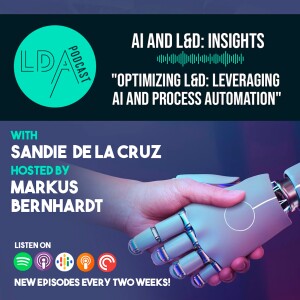
Thursday May 30, 2024
Thursday May 30, 2024
Join Markus Bernhardt in this enlightening conversation with Sandie de la Cruz, a seasoned automation specialist and Digital Solutions Manager at Edwards Life Sciences. Dive into the world of AI and process optimization as Sandie shares her expert insights on enhancing operational efficiency and strategic implementation in learning and development, and beyond. Discover the transformative potential of automation tools and learn practical strategies to streamline your L&D operations for a smarter and more effective workflow.
Shownotes:Connect with Sandie de la Cruz on LinkedIn.Business Process Automation Tools:
Zapier - Connects your apps and automates workflows.
UiPath - A leader in robotic process automation (RPA) software that automates repetitive office tasks.
Blue Prism - RPA tool that provides a virtual workforce powered by software robots.
Microsoft Power Automate - Helps automate workflows between your apps and services to synchronize files, get notifications, collect data, and more.
Marketing Automation Tools:
HubSpot - Integrates a variety of marketing tools into one platform, including email marketing, social media campaigns, and lead management.
Marketo - Provides tools for email marketing, lead nurturing, and marketing analytics.
Mailchimp - Known for email marketing automation but also includes ad campaign and landing page features.
Additional Resources:
Learn and develop your skills through Microsoft Learn.
Join Google Women Techmakers for initiatives supporting women in technology.
Advance your knowledge in AI with Google's AI Certificates.
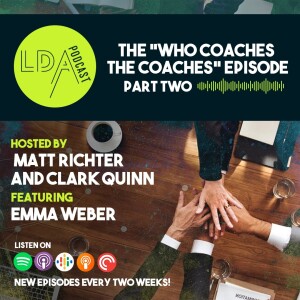
Thursday May 16, 2024
Thursday May 16, 2024
We welcome back Emma Weber for part II of our conversation about coaching. This episode focuses on the qualifications and requirements for what makes an effective coach. We start with how to go about finding a coach.
Emma offered to provide any listeners with her Assessing Coaching Capability Grid. You can get it here:
https://mailchi.mp/leverlearning.com/svcitt67nx
We briefly discuss Self-Determination Theory, a motivation model widely researched and used globally. You can learn more about it here: https://selfdeterminationtheory.org/
We talk about Paul Kirschner and John Sweller who have researched and talked extensively about explicit and direct instruction versus the "in the flow of work" folks like Conrad Gottfredson and Bob Mosher from 5 Moments of Need. You can learn more about the thoughts of Paul here: https://3starlearningexperiences.wordpress.com/
And 5 Moments of Need here: https://www.5momentsofneed.com/
Clark references Harold Jarche's Seek, Sense, Share: https://jarche.com/pkm/
We also talk about the professionalization of coaching. Should coaches... how can coaches... be certified? Can coaching be standardized?
And we talk about coach bots.
Of course, we end with the Best and the Worst where we discuss conference season and who attends the sessions.
Shameless plug for Matt's new book with Thiagi on LDA Press... you can pre-order it here in French or English: https://ldaccelerator.com/techniques-interactives-pour-lapprentissage
And additional shameless plug... LDA has partnered with the Center for Self-Determination Theory to produce a new, monthly podcast/ video cast where we engage with a researcher/ practitioner in the motivational psychology field about their respective work. You can find the show, and subscribe to it, here: https://ldaccelerator.com/sdtpodcast
For those unfamiliar with Emma, she is the founder of Lever – Transfer of Learning, and developer of the Turning Learning into Action™ methodology. In 2002 Emma left a successful corporate career in London to start her own business in Australia, following her passion for coaching and learning. Her firm belief, and the platform on which she has built her successful global business, is that the goal of learning in the workplace is to create tangible business benefits. She established Lever – Transfer of Learning to help organisations and their employees convert learning to effective action back on the job. Under her guidance Lever Learning now delivers programs throughout 16 countries and in 11 languages. She is the author of Turning Learning into Action: A Proven Methodology for Effective Transfer of Learning, published by Kogan Page in 2014.
You can find Emma via her website: https://transferoflearning.com/ or on LinkedIn: https://www.linkedin.com/in/emmaweber/.
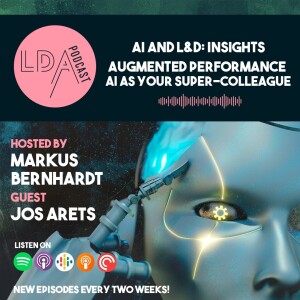
Thursday May 02, 2024
Thursday May 02, 2024
In this episode, Markus and Jos Arets from Tulser and Partners in AI, dive into all things learning and augmented performance, and the role Large Language Models are starting to play in supporting workers as a super-colleague. Jos' also dives into the work of nurses and doctors, a fascinating use case, and an area that is particularly close to Jos' heart since his time as CLO of Maastricht University Hospital.
SHOWNOTES:
You can find Jos at these locations:
https://www.linkedin.com/in/josarets/
@AretsJos at X
https://tulser.com
https://www.partnersinai.com/en
Resources generative AI by Jos Arets:
https://www.partnersinai.com/en/post/explore-the-untapped-potential-of-exemplary-performers-within-organizations-and-teams
https://elearningindustry.com/is-ai-the-bicycle-of-the-mind-performance-augmentation-in-corporate-elearning
https://elearningindustry.com/is-ai-the-bicycle-of-the-mind-performance-support-powered-by-artificial-intelligence
https://elearningindustry.com/is-ai-the-bicycle-of-the-mind-learning-in-the-flow-of-work
https://elearningindustry.com/is-ai-the-bicycle-of-the-mind-ai-driven-skills-competency-development
https://elearningindustry.com/is-ai-the-bicycle-of-the-mind-amplifying-evidence-informed-ld-with-ai
https://elearningindustry.com/is-ai-the-bicycle-of-the-mind-lds-role-in-developing-competencies-and-augmenting-human-capabilities-without-and-with-ai

Thursday Apr 18, 2024
Thursday Apr 18, 2024
In this episode, we asked our good friend, David Ganulin to join us to talk about marketing and how the domain of marketing can inform learning and development. Of course, that didn't stop us from deviating off topic! Of course, we still do The Best and the Worst.We have a brief conversation about the following concepts: Hard Fun, coined by Dr. Seymour Papert. You can find out more here: https://dailypapert.com/hard-fun/Mihaly Robert Csikszentmihalyi: Flow: https://en.wikipedia.org/wiki/Flow_(psychology)Vygotsky and Zone of Proximal Development: https://en.wikipedia.org/wiki/Zone_of_proximal_developmentRobert Bjork- Desired Difficulty: https://3starlearningexperiences.wordpress.com/2023/02/21/demystifying-desirable-difficulties-1-what-they-are/Anders Ericsson Deliberate Practice: https://psycnet.apa.org/record/1993-40718-001Matt differentiates between Openers and Icebreakers here: https://www.thiagi.com/games/2023/4/27/linking-in-with-mattIn the meantime, Matt referenced LDA's good friend, Ashley Sinclair and her company, MAAS Marketing, which provides marketing services specifically for L&D teams in organizations. You can find out more about Ashley here: https://www.maas-marketing.co.uk/A bit more about Dave:David Ganulin tries to use his marketing superpowers so good triumphs over evil. He loves that he can write in the third person, as well as the fact that he literally just used the term "marketing superpowers" in the first sentence of a professional bio unironically. He graduated from the University of Rochester with an M.S in Teaching, Curriculum, and Development and upon graduation, left for Japan where he served as a college Professor for five years in a variety of institutions teaching English as a Second Language, English literature, writing, and other advanced classes. Upon returning to New York City in 2000, he found himself at the tail end of Dot Bomb 1.0, and we all know how that went! He served in a variety of marketing positions beginning in 2001 and was lucky enough to learn the field from the ground up from being hands-on as well as from some incredible Mentors in the field. Along the way--while serving in a variety of higher level positions, he caught the entrepreneur bug and in 2001 (when absolutely nobody knew what a kettlebell was) ended up finding, scaling (with no outside capital), and eventually exiting a leading B2B education company KettleBell Concepts. He's been working alongside Pete Moore--Managing Partner of Integrity Square--as the firm's Chief Marketing Officer and Executive Producer of HALO Talks podcast since October 2018.You can find David here:Integrity Square: https://www.integritysq.com/Halotalks: https://www.halotalks.com/LinkedIn: https://www.linkedin.com/in/davidganulin/
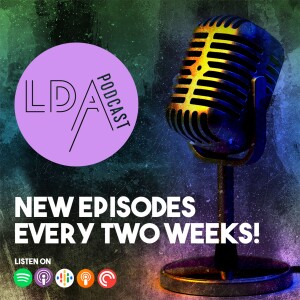
Monday Apr 08, 2024
Monday Apr 08, 2024
In this thought-provoking episode, Markus interviews Mike Vaughan, a seasoned expert in AI applications, as well as neuroscience. Discover how AI is revolutionizing simulations, making them more accessible and cost-effective. Learn about the shift towards experience-centric learning and the potential of AI-powered personalized and adaptive learning within simulations. Mike also shares insights on the current state of AI adoption in organizations and emphasizes the importance of community for L&D professionals navigating the rapid changes brought by AI. Tune in to stay ahead of the curve and learn how AI is shaping the future of learning and development.Here is how you can find Mike:The Thinking Effect - https://www.thethinkingeffect.com/Mike Vaughan on Linkedin - https://www.linkedin.com/in/michaelsvaughan/The Regis Company - https://go.regiscompany.com/your-organizations-fast-track-to-skill-development-0
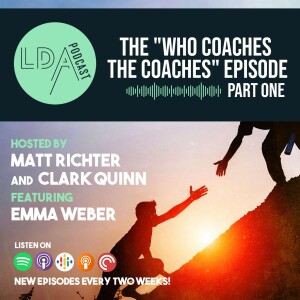
Thursday Mar 21, 2024
Thursday Mar 21, 2024
Clark and Matt are joined by the wonderful Emma Weber. For those unfamiliar with Emma, she is the founder of Lever – Transfer of Learning, and developer of the Turning Learning into Action™ methodology. In this first episode of a two-part series, we explore coaching. What is it? How does it work? How should it work. And, of course, we go all over the place as we converse. We end the episode with the best and the worst.Emma and Clark reference LDA friend, Julie Dirksen and her latest book, Talk to the Elephant and her first book, Design for How People Learn. We talked with Julie just a few episodes ago.Clark references Collins and Brown's application of Cognitive Apprenticeship Theory. https://en.wikipedia.org/wiki/Cognitive_apprenticeshipEmma references Bill Anderson, CEO of Bayer. https://en.wikipedia.org/wiki/Bill_Anderson_(businessman).Clark references Hersey and Blanchard's Situational Leadership Model. https://en.wikipedia.org/wiki/Situational_leadership_theory. The debate between Matt and Emma is/ was on April 3, 2024 and can be found on the LDA website.More about Emma. In 2002 Emma left a successful corporate career in London to start her own business in Australia, following her passion for coaching and learning. Her firm belief, and the platform on which she has built her successful global business, is that the goal of learning in the workplace is to create tangible business benefits. She established Lever – Transfer of Learning to help organisations and their employees convert learning to effective action back on the job. Under her guidance Lever Learning now delivers programs throughout 16 countries and in 11 languages. She is the author of Turning Learning into Action: A Proven Methodology for Effective Transfer of Learning, published by Kogan Page in 2014. You can find Emma via her website: https://transferoflearning.com/ or on LinkedIn: https://www.linkedin.com/in/emmaweber/.In Part two, available in a month, we will explore coaching accreditation. Who decides what makes a good coach and how can one evaluate the quality of all those coaches out there? And, of course what kind of coaching is effective?
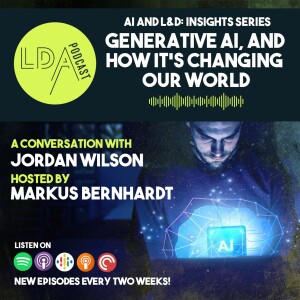
Thursday Mar 07, 2024
Thursday Mar 07, 2024
In this episode of the LDA Podcast, we are joined by Jordan Wilson, host of the top 10 podcast "Your Everyday AI". Together with Jordan, we review the developments of Generative AI, why he started the podcast, how it is changing the way we learn and the way we work, why not to trust AI detection systems, and much, much more.Show notes:Your Everyday AI Website: www.youreverydayai.comJordan Wilson: https://www.linkedin.com/in/jordanwilson04/








